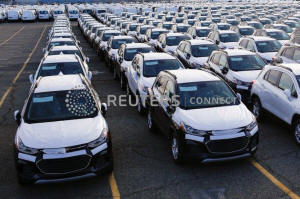Trump declares some auto imports pose national security
threat
 Send a link to a friend
Send a link to a friend
 [May 18, 2019]
By David Shepardson [May 18, 2019]
By David Shepardson
WASHINGTON (Reuters) - U.S. President
Donald Trump on Friday declared that some imported vehicles and parts
pose a national security threat but delayed a decision for as long as
six months on whether to impose tariffs to allow for more time for trade
talks with the European Union and Japan.
The unprecedented designation of foreign vehicles imported to the United
States from some of its closest allies sparked anger from automakers,
dealers and foreign governments after a White House document hinted it
would seek voluntary export quotas on autos from U.S. trading partners.
Toyota Motor Corp, which said in March it is investing $13 billion in
U.S. operations through 2021, called the designation "a major set-back
for American consumers, workers and the auto industry" and said it sent
the message "our investments are not welcomed."
European Trade Commissioner Cecilia Malmstroem said on Twitter that "we
completely reject the notion that our car exports are a national
security threat. The EU is prepared to negotiate a limited trade
agreement (including) cars, but not WTO-illegal managed trade."

World Trade Organization rules bar voluntary export restraints and the
EU has repeatedly said it would not agree to any quotas on auto exports.
Trump's decision, at least for now, averts what was shaping up to be a
new dramatic escalation in the Trump administration's trade disputes
around the world, including a trade war with China.
On Friday, Trump continued his rhetoric attacking foreign imports from
the EU. "They have trade barriers. They don't want our farm products,
they don't want our cars. They send Mercedes-Benz's in here like they're
cookies," he told a group of real estate agents. "They send BMWs here.
We hardly tax them at all."
The president had faced a Saturday deadline to make a decision on
recommendations by the Commerce Department to protect the U.S. auto
industry from imports on national security grounds and imposing tariffs
of up to 25 percent.
Trump directed U.S. Trade Representative Robert Lighthizer to pursue
negotiations with the EU, Japan and any other country he deemed
appropriate and report back within 180 days. If no deal is reached,
Trump will decide by then "whether and what further action needs to be
taken."
In a proclamation released Friday, Trump agreed with a Commerce
Department study that found some imported cars and trucks are "weakening
our internal economy" and threaten to harm national security, but it
stopped short of naming specific vehicles or parts.
Automakers warned the tariffs cost hundreds of thousands of auto jobs,
dramatically raise prices on vehicles and threaten industry spending on
self-driving cars.

A group representing major German and Asian automakers including Daimler
AG, Volkswagen AG, Honda Motor Co and Nissan Motor Co, called the
suggestion some auto imports are a national security risk "absurd."
The group added that "no one in the industry has asked for tariffs or
other ‘protection’ from the government."
[to top of second column] |

Imported automobiles are parked in a lot at the port of Newark New
Jersey, U.S., February 19, 2019. REUTERS/Eduardo Munoz/File Photo

"The truth stands: imported autos and auto parts are simply not a national
security threat," said Cody Lusk, president of the American International
Automobile Dealers Association. "Using this spurious claim as justification to
force our trading partners into new negotiations will only create more
uncertainty for America's entire auto industry."
The Alliance of Automobile Manufacturers, a trade group representing General
Motors Co, VW, Ford Motor Co and others, said the companies remained "deeply
concerned that the administration continues to consider imposing auto tariffs."
The group said that since 2017 automakers have invested $22.8 billion in new and
existing facilities in the United States, but "increased auto tariffs threaten
to undo this economic progress. At the end of the day, you can have tariffs or
investment, but you can't have both."
Senator Ron Wyden, a Democrat, criticized Trump's finding and said his "petulant
threats will only make it less likely our allies will work with us to confront
our collective challenges with China and to fix real trade problems."
A revised U.S. trade deal with Mexico and Canada signed in November effectively
shields existing imports from the two nations to the United States from national
security tariffs.
The auto tariffs face strong opposition in Congress, including from many
prominent Republicans. The White House has refused to release the auto import
study to Congress.
Trump's proclamation said "domestic conditions of competition must be improved
by reducing imports" and said a strong U.S. auto sector is vital to U.S.
military superiority.

The reports cited statistics that U.S.-owned companies' share of the U.S.
automobile market has declined from 67 percent, or 10.5 million units produced
and sold in the United States, in 1985, to 22 percent, or 3.7 million units
produced and sold in the United States, in 2017.
At the same time, the Commerce Department report stated that imports nearly
doubled - from 4.6 million units to 8.3 million units.
U.S. Commerce Secretary Wilbur Ross told Trump that "successful negotiations
could allow American-owned automobile producers to achieve long-term economic
viability and increase R&D (research and development) spending to develop
cutting-edge technologies that are critical to the defense industry."
The report called the European Union and Japan "protected foreign markets" that
"impose significant barriers to automotive imports from the United States,
severely disadvantaging American-owned producers."
The United States also has barriers to imports, most notably a 25 percent tariff
on pickup trucks from outside North America.
(Reporting by David Shepardson in Washington; Editing by Nick Zieminski and
James Dalgleish)
[© 2019 Thomson Reuters. All rights
reserved.] Copyright 2019 Reuters. All rights reserved. This material may not be published,
broadcast, rewritten or redistributed.
Thompson Reuters is solely responsible for this content. |